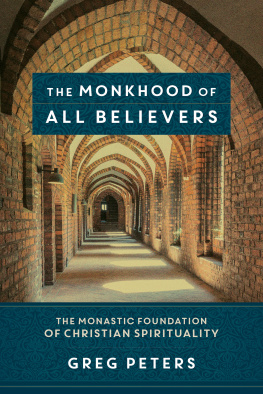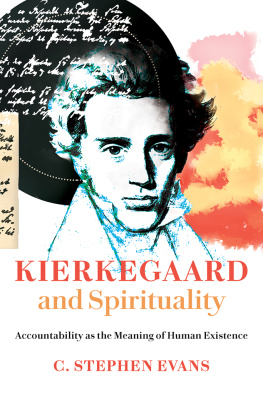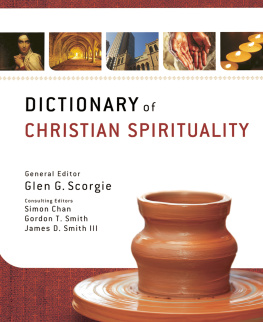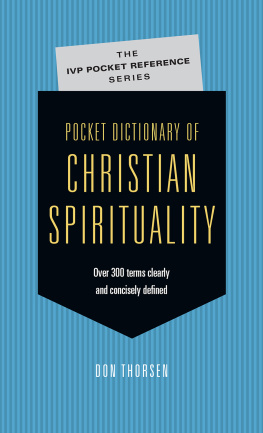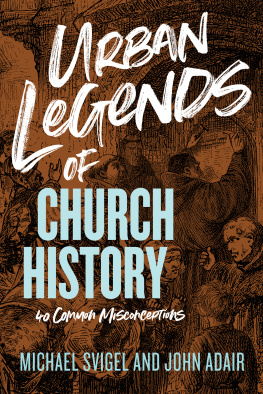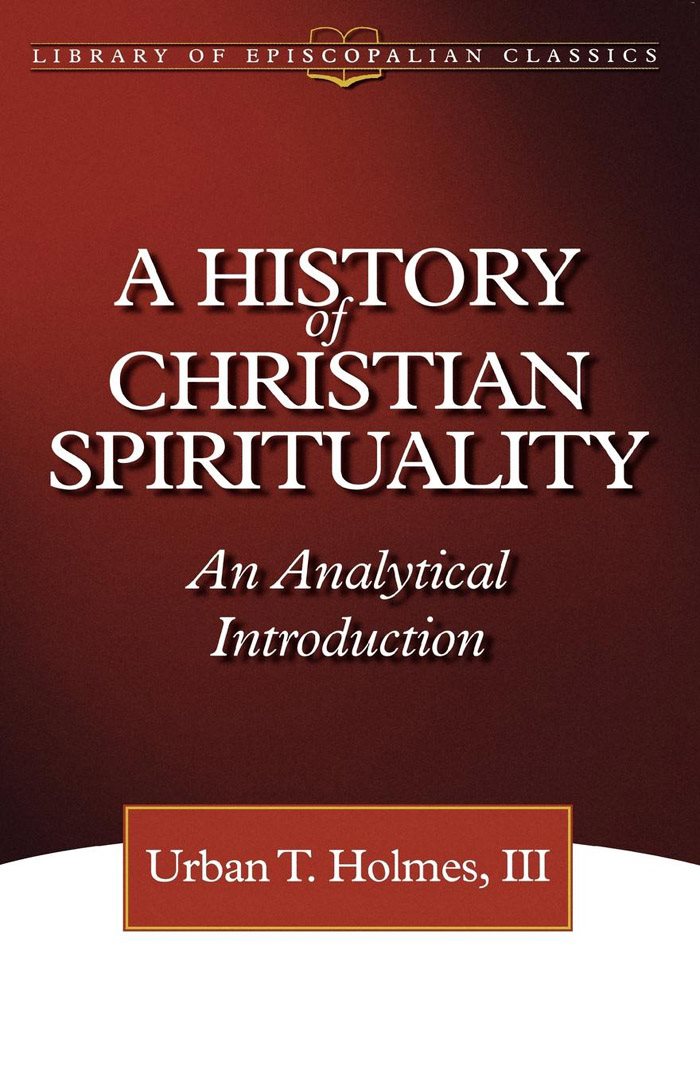A HISTORY OF
CHRISTIAN SPIRITUALITY

A HISTORY
of
CHRISTIAN
SPIRITUALITY
An Analytical Introduction
Urban T. Holmes, III
Foreward by O. C. Edwards, Jr.

Copyright 2002 by Jane Holmes
All rights reserved. No part of this book may be reproduced, stored in a retrieval system, or transmitted in any form or by any means, electronic or mechanical, including photocopying, recording, or otherwise, without the written permission of the publisher.
Originally published in 1980 by The Seabury Press.
Morehouse Publishing, 4775 Linglestown Road, Harrisburg, PA 17112
Morehouse Publishing, 445 Fifth Avenue, New York, NY 10016
Morehouse Publishing is an imprint of Church Publishing Incorporated.
www.churchpublishing.org
Library of Congress Cataloging-in-Publication Data
Holmes, Urban Tigner, 19301981
A history of Christian spirituality: an analytical introduction /
Urban T. Holmes III
p. cm. (Library of Episcopalian classics)
Originally published: New York : Seabury Press, 1980
Includes bibliographical references and index
ISBN 978-0-8192-1914-5 (pbk.)
1. SpiritualityHistory. I. Title. II. Series.
BV4490 .H63 2002
248.09dc21
2001044976
Printed in the United States of America
Contents
O. C. Edwards, Jr.
Foreword to the Second Edition
The Very Reverend Urban T. Holmes, III, known to everyone as Terry, probably had the most creative theological mind in the Episcopal Church during the second half of the twentieth century, if not the century as a whole. Thats surprising because his academic specialty was not one of the more abstract theological disciplines, such as systematics or dogmatics, but pastoral theology. His teaching was in the practical fields; at one time or another, he taught all the how-to-do-it courses in the seminary curriculum.
His brilliance lay in his approach, which was to locate the practice of ministry in a total understanding of the life of the church in God. The son of an eminent medievalist, his original training was in the classical academic disciplines. He had a masters degree in classical languages and history, and he wrote a master of sacred theology thesis on a patristic topic. But his ten years of experience as a university chaplain caused him to focus his attention on psychology. In his doctoral work under the Jesuits at Marquette University, he explored the way that the other human sciences, such as sociology and anthropology, furnish data for theological reflection. His real field became what is called fundamental theology, the discipline that reflects on the legitimacy of the theological enterprise. He became interested in how it is possible To Speak of God, to use the title of a book he wrote with a sixteen-year-old daughter.
His insights were shared through a number of channels: seminary classrooms, workshops he conducted, and a long stream of book reviews, journal articles, and books. He began dealing with practical issues facing the church in such works as The Future Shape of Ministry. He moved on to reject the then-dominant paradigms in pastoral theology, pastoral counseling and professionalism. In his later books, Ministry and Imagination and The Priest in Community, he began to focus on the Godward life of congregations and the sort of ministerial leadership that demanded.
Before his premature death at age fifty-one, his thought had begun to shift more and more towards the area of spirituality. This book is one of the earliest manifestations of that shift, but it is also reflected in his book on evangelism, Turning to Christ, which came out in 1981, the year he died, and Spirituality for Ministry, which was published posthumously.
What he means by A History of Christian Spirituality is spelled out in his conclusion: over two thousand years of the sense a tradition has made of the experience of prayer (p. 157). And, as he states in the introduction, To be spiritual means more than to be capable of receiving God into our lives. It means that we are called to know God (p. 1). The way we know God is through Gods self-disclosure, and the medium of that self-disclosure is prayer.
Not surprisingly, in the last 2,000 years the Christian experience of prayer has taken many different forms in many different cultures. The disciplined reflections of Christians on those experiences, and their interpretations of what has happened to them in prayer, have varied even more. Merely to summarize these reflections, much less to analyze them, seems a foolhardy undertaking in a book of less than 200 pages. For example, almost as many figures are discussed in this history of spirituality as there are pages in the book, yet most of these individuals wrote much longer books to explain their personal understanding. Certainly this book is meager compared to the three thick volumes on Christian Spirituality recently published by Crossroad, not to mention the sixteen volumes of Dictionnaire de Spiritualite.
What Holmes intends in this book is very different. It reminds me more than anything else of a travel guide you might read before visiting a country. It helps you know what to expect. To provide this overview, A History of Christian Spirituality has to cover an enormous amount of material in a very concise way, so that each reader can learn about where he or she wishes to go. The book does not exhaust curiosity; instead, it excites interest. The words of T. S. Eliot best express its spirit: Oh, do not ask, What is it?/ Let us go and make our visit. This book will fail in its purpose if it does not lead readers to some of the many writers it introduces. But its real intent is more profound: to lead readers into a deeper life of prayer. And, because the book explains the variety of ways Christian have prayed through the centuries, it also helps readers to pray with greater understanding. That idea is reflected in the subtitle, An Analytical Introduction.
In his opening chapter, Holmes introduces readers to the technical vocabulary he uses throughout the book to situate the various writers in the total history. He draws on the human sciences: psychology, anthropology, and sociology to help him explain prayer. These social disciplines give him the analytical tools to make sense of the variety of the spiritualities he introduces. Readers must master the vocabulary in the introduction to understand fully what follows. But with a little effort, the rest should be smooth sailing through deep water.
The French have a proverb: appetite comes while (and from) eating. May that prove true for you spiritually as you set out on a fascinating journey with this book as a guide.
O. C. Edwards, Jr.
October, 2001
Preface
This book is the result of finding nothing to recommend to my students as an introduction to the wide variety and great richness of the Christian spiritual experience. There is never time in class to do anything but mention a few highlights, and the texts available are either too detailed, too unbalanced, or both. So I have tried my hand at a relatively new venture for me.


